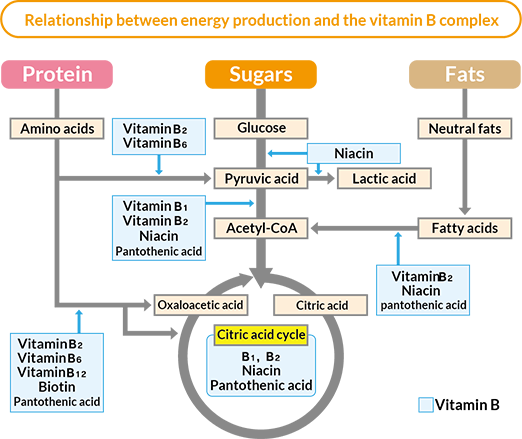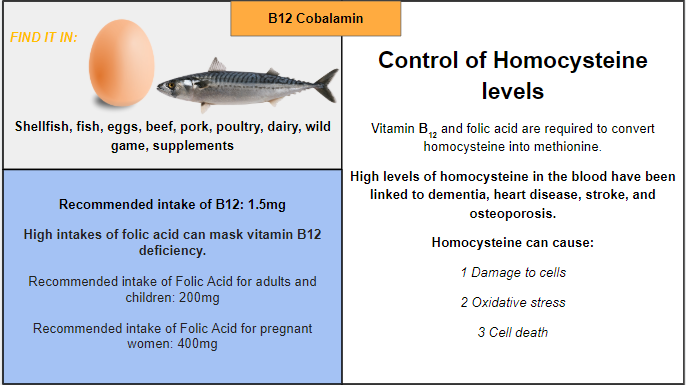This is my second post on B-Vitamins – the last 4 of the 8 in total. This post will cover information about Pyridoxine (B6), Biotin (B7), Folate (B9) and Cobalamin (B12).

All are involved in converting the food that we eat (carbohydrate, protein & fat) into fuel (glucose) and into energy. The energy is known as ATP and can be used, or stored (in the form of glycogen) for later use. This will be covered a little bit more in when focusing on B7 Biotin.
We must restore our body’s supply of B-Vitamins to supply energy to our body, and for a number of other reasons that we will cover in this post as we cannot store them in our body.
Pyridoxine (B6)
Is found in: Tuna, salmon, shrimp, milk, cheese, lentils, spinach, sunflower seeds and is involved in energy production, brain health and neurotransmitter production.

A number of neurotransmitters are produced with the help of pyridoxine, including dopamine, GABA (gamma-aminobutyric acid), serotonin and norepinephrine.
Norephinephrine can also be known as noradrenaline, and stops the body from becoming too cold by narrowing blood flow, restricting the flow of blood to the skin and distributes it within the organs.
Serotonin helps to produce melatonin, a hormone involved with sleep regulation. Melatonin is produced by the pineal gland, levels are high at night, and low during the day. When the sun goes down and it is dark, the input from your eyes (little light input) will cause melatonin to be produced and levels will rise, causing you to feel less alert, and more tired. The levels stay high during night-time, and daytime concentrations then dip when the light input from the eyes increases.
Low levels of both serotonin and norepinephrine have been found in patients with depression, and anxiety.
A lack of dopamine can cause depression, chronic boredom, loss of satisfaction, chronic fatigue and low physical energy with no desire to move the body – a lack of drive, motivation and enthusiasm as dopamine is related to reward-motivated behavior, movement and control.
A neurotransmitters job is to transmit electrical signals from nerve cells to target cells (e.g. muscles, glands or other nerve cells including ones in the brain) so if dopamine release is low – behaviour, movement and control will be usually slow, poor and difficult.
Biotin (B7)

Is found in: Brewer’s yeast, eggs, sardines, almonds, peanuts, pecans, walnuts, mushrooms and is involved in energy production, and keeping healthy hair, skin and nails.
So B-Vitamins act as a co enzyme (something necessary for a reaction to occur) and process the carbohydrates, lipids (fats) and proteins from our food so that we are able to generate energy. The energy generated is used in the form of ATP (adenosine trphosphate) to drive the movement of body reactions, breathing, heart rate and thinking. In order to ensure that your body is able to breakdown carbohydrates and lipids into energy (ATP) it is important to get a balance of B-Vitamins.
Here, have a look at where the B-Vitamins are involved in processing and breaking down the macronutrients in order to create ATP:

(Otsuka Pharmaceutical Co., Ltd., 2020)
You can see the B-Vitamins help to convert the components of the macronutrients (carbs, fats and proteins) ultimately into into Acetyl-CoA which is then combined with oxaloacetate acid within the citric acid cycle/krebs cycle. This is passed through a number of other reactions, to convert in to energy which we can use!
Folate / Folic Acid (B9)
Is found in: Leafy greens, asparagus, root vegetables, brussel sprouts, lima beans, whole grains, orange juice, avocado, milk, salmon and is involved in energy production, cell growth, DNA synthesis, red blood cells and iron use, and is an important prenatal vitamin.
Folate deficiency increases the risk of NTDs, like spina bifida, a condition where an unborn baby’s spine and spinal cord don’t develop properly, and usually detected during the anomaly scan. It can lead to bowel or urinary incontience, weakness in the legs, or loss of skin sensation in the legs. Supplementation with folic acid decreases the risk of unborn babies developing this, and if planning to have a baby, you should supplement with tablets for 2-3 months before you conceive. 400micrograms (mg) per day for pregnant women and those trying to conceive.
B9 deficiency can also lead to folic acid deficient anaemia. Folate (B9) is required to make red blood cells which carry oxygen around the body, needed to convert the food and liquid we take in into energy, and allows us to breathe! Low levels of B9 can lead to a lack of energy, muscle weakness, tiredness and memory problems.

Cobalamin (B12)
Is found in: Shellfish, fish, eggs, beef, pork, poultry, dairy, wild game and is involved in energy production, cell health, heart and nerve cell health, and the control of homo cysteine levels (along with folate!)
Homocysteine is an amino acid, and high levels of can lead to dementia, heart disease, stroke, and osteoporosis. High levels in the blood can damage or kill cells, (e.g. those on artery walls causing blood vessel damage, which can lead to damage to organs e.g. heart, eye.) and lead to oxidative damage (which damages cells, proteins and DNA).
Both Vitamin B9 and B12 are required to convert homocysteine into methionine.

If you eat meat, fish or dairy foods, you should be able to get enough vitamin B12 from your diet. But is not found naturally in foods such as fruit, vegetables and grains, vegans may not get enough of it. We are recommended to have at least 1.5mg of Vitamin B12 each day.
Be careful if you take supplements for B9, or B12 – as too much of both can be dangerous.
Too much Vitamin B9 can hide the fact that you have B12 deficiency and could lead to high levels of homocysteine.
Too much B12 can lead to dizziness, headaches, anxiety, and vomiting.
Picture from:
Otsuka Pharmaceutical Co., Ltd. (2020). Energy production and B vitamins | Otsuka Pharmaceutical Co., Ltd.. [online] Available at: https://www.otsuka.co.jp/en/nutraceutical/about/nutrition/sports-nutrition/essential-nutrients/vitaminbcomplex.html [Accessed 8 Jan. 2020].
